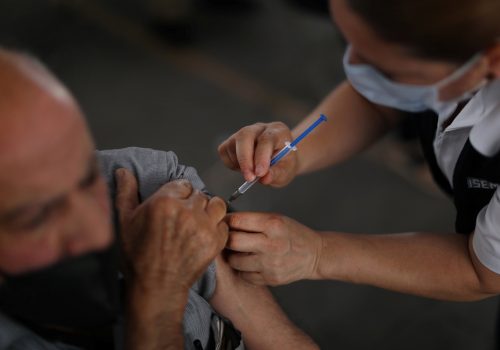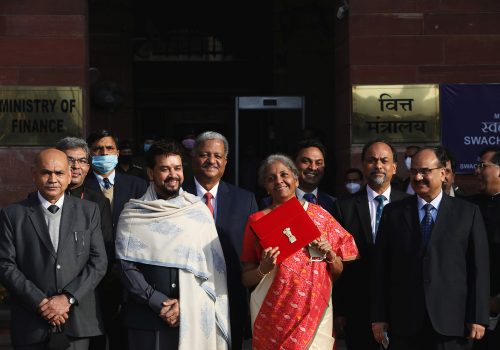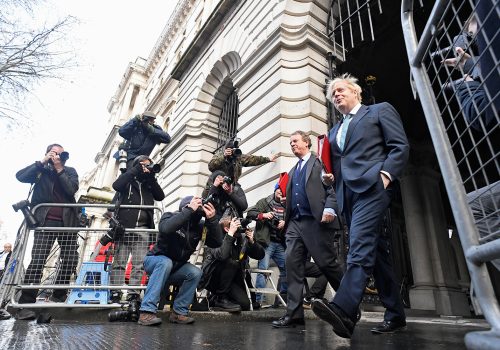Experts react: EU and India clash on vaccines, make strides on trade
On May 8, 2021, leaders from the European Union (EU) and India met virtually in Porto, Portugal, for the EU-India Leaders’ Meeting. With an emphasis on shared interests, democratic values, and respect for human rights—a controversial issue given India’s recent democratic backslide—the meeting culminated in the renewal of free-trade negotiations, the start of two additional trade agreements, and a new Connectivity Partnership. This represents a significant opportunity for India as the country is one of two with which the EU has concluded such a partnership.
Here’s how our South Asia Center experts broke down the meeting, which touched on climate change, trade, security, human rights, COVID-19, technology, and more.
Jump to an expert reaction
Rudabeh Shahid: Debate over vaccines and a weak showing on human rights
Ajay Chhibber: Renewed opportunity for a bold, historic trade agreement
Mark Linscott: Don’t expect a significant trade shift soon
Atman Trivedi: China’s shadow on trade talks
Amber Jamil: Major steps on climate
Anand Raghuraman: A new sphere of influence on tech
Debate over vaccines and a weak showing on human rights
India, which is deemed the vaccine capital of the “developing world,” is now facing paramount challenges as it tries to fight the raging pandemic at home. During the EU-India summit, Prime Minister Narendra Modi asked EU leaders to support proposals by India and South Africa to waive patents on COVID-19 vaccines. The EU leaders believe that instead of patent protection issues, global vaccine shortages were due to limited production capacity and quality standards. Waiving patents is a welcome move as it will encourage opening other production lines to add to the global supply of COVID-19 vaccines. Bangladesh-based Incepta alone could produce 600-800 million doses of vaccine per year if it could procure the necessary raw materials and licenses from World Health Organization-approved vaccine makers. The United States has already declared its support for waiving patents, but the EU and others continue to stand in the way of World Trade Organization (WTO) approval.
Over the past two-to-three years, numerous activists in India have been detained because of their protests against the draconian Citizenship Amendment Act and National Register of Citizens. Before the summit, international human-rights organizations including Amnesty International, Front Line Defenders, and Human Rights Watch had appealed to European leaders to raise concerns at the EU-India summit instead of making hollow references to “shared values of human rights and democracy” in their joint statements. Yet, disappointingly, this is exactly what happened at the meeting.
Rudabeh Shahid is a non-resident senior fellow at the Atlantic Council’s South Asia Center.
Renewed opportunity for a bold, historic trade agreement
Amidst a raging pandemic, India and the EU have agreed to pursue a bold new trade agreement. EU-India trade talks were frozen in 2013 over differences including tariff reductions, patent protection, data security, and the right of Indian professionals to work in Europe. The EU is India’s second largest export market, but at forty billion dollars in goods and just over twenty billion dollars in services, Indian exports form a very small share of the EU’s two-trillion-dollar import market. EU exports to India are in a similar range. Starting from a low level, and considering the massive economic complementarities between India and the EU, and their many common challenges and shared values, the upside potential for the agreement is huge. It will require determined leadership on both sides to make it happen.
Ajay Chhibber is a nonresident senior fellow at the Atlantic Council’s South Asia Center, as well as a distinguished visiting fellow at the Institute for International Economics Policy at George Washington University.
Don’t expect a significant trade shift soon
As global strategic alliances adjust to deal with the China challenge, trade alliances may follow, although we should not expect significant changes in the EU-India trade and investment relationship anytime soon. The summit’s statement on the resumption of bilateral free-trade agreement negotiations and pursuit of a new investment agreement is much easier said than done. Pragmatic trade negotiators will recognize that a free-trade agreement is years away at best and likely not worth a realignment of attention and resources. The multilateral dynamic on the WTO patent waiver issue will be an interesting one. Although the Biden administration has moved forward with expressions of support for the India-South Africa proposal, the EU is skeptical and for good reasons. They will be players in this.
Mark Linscott is a nonresident senior fellow with the Atlantic Council’s South Asia Center. Prior to joining the Atlantic Council, he was the assistant US trade representative for South and Central Asian Affairs from December 2016 to December 2018.
China’s shadow on trade talks
The revival of moribund EU-India trade negotiations towards a comprehensive deal is a most welcome development. Both sides will need to find ways to resolve differences that led to earlier breakdowns in talks, including on market access for professional services and auto parts. Convergence on data protection standards will also require creative compromises.
A rising China’s deteriorating relations with the EU and India are providing fresh impetus for their trade and investment partnership. Closer alignment on digital and transportation infrastructure as well as emerging technologies would complement the EU’s and India’s evolving collaboration with the United States.
More and more, Europe and India seem to be coming to an understanding that growing cooperation is an essential part of any diplomatic design to encourage greater restraint on the part of Beijing.
Atman Trivedi is a nonresident senior fellow at the Atlantic Council’s South Asia Center and has over twenty years of foreign policy and trade experience with expertise in India and the broader Asia region.
Major steps on climate
The velocity of multilateral cooperation on climate change accelerated this weekend with the EU-India Leaders’ Meeting. Representing nearly two billion people between them, the parties agreed to mobilize policy, technology, and finance towards the low-carbon transition through a new work program in support of the EU-India Clean Energy and Climate Partnership. In addition, the long-sought Connectivity Partnership is a model for the decarbonization of trade policy, especially in the critical energy sector. This cooperation framework allows the EU’s so-called Annex II countries—as defined in the United Nations Framework Convention on Climate Change as Organisation for Economic Co-operation and Development members minus countries with transition economies in 1992—to fulfill their differentiated financial responsibilities to developing countries. We are witnessing leadership in response to the global need for net-zero emissions by 2050.
Amber Jamil is an international relations professional with a focus on South Asia and a nonresident senior fellow at the Atlantic Council’s South Asia Center.
A new sphere of influence on tech
Saturday’s virtual summit between Modi and EU leaders was an important convening that signaled growing strategic and commercial convergence between the two sides, including in the digital domain. India and the EU recognize the risks posed by China’s expanding “Digital Sinosphere,” while at the same time, they are unwilling to let US dominance of the digital ecosystem remain as the only suitable alternative. By coming together, India and the EU see an opportunity to use their collective weight in the digital arena to shape new norms and regulatory structures around data governance as well as emerging technologies. Both sides agreed to work together to “enhance convergence between their regulatory frameworks to ensure a high degree of protection of personal data and privacy.” The EU-India Connectivity Partnership announced at the summit also recognized that “convergence of data protection standards is important for setting global standards.” The real open question is whether India and the EU can start building toward that convergence, especially as India advances a Personal Data Protection Bill that will require both sides to grapple with thorny issues such as data localization and adequacy standards.
Anand Raghuraman is a nonresident fellow at the Atlantic Council’s South Asia Center and a vice president at The Asia Group, where he advises leading companies operating in South Asia across the internet, e-commerce, social media, fintech, and financial services sectors.
Further reading
Image: European Council President Charles Michel participates in an online summit with Indian Prime Minister Narendra Modi during the EU summit round table meeting at the Crystal Palace. Photo by Dario Pignatelli/European Council via Reuters.


